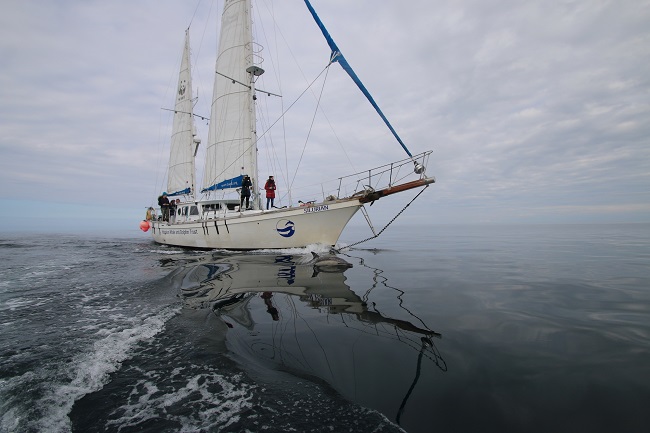Research reveals Scotland’s west coast as global cetacean hotspot
Scotland’s west coast seas are a global hotspot for cetaceans and basking sharks, and need better protection, said Hebridean Whale and Dolphin Trust as it released a new marine atlas capturing key discoveries made over the past 15 years.
The first Hebridean Marine Mammal Atlas showcases findings by the charity’s scientists and citizen science volunteers during annual research expeditions on its specialized yacht Silurian.

The findings highlight the region’s extraordinary biodiversity and shed new light on its whales, dolphins and porpoise – collectively called cetaceans – and basking sharks.
“This pioneering research is transforming our understanding of the Hebrides’ remarkable cetaceans, while offering new insights about trends and changes in the marine environment,” said Dr Lauren Hartny-Mills, Science and Policy Manager at Hebridean Whale and Dolphin Trust.
The atlas also celebrates the contribution of over 700 paying volunteers who have joined one of 200 research expeditions on Silurian, making the surveys possible year after year.
Television presenter Liz Bonnin, patron of the trust, said: “It is increasingly clear that the Hebrides is a truly special place for cetaceans and basking sharks, and that we need to do far more to protect them and their environment. I had the great pleasure of sailing on Silurian and I am thrilled to be able to lend my support to such an outstanding organisation which works directly towards these goals.”
So far, 23 cetacean species – a quarter of all known globally – have been recorded in the Hebrides. Since 2002, Silurian has travelled more than 100,000 kilometres – the equivalent of sailing two and a half times around the world – and 30,000 animals have been recorded.
Discoveries include the Hebrides being a vital feeding ground for minke whales and basking sharks, and that the region is one of the most important areas for harbour porpoise in Europe. The trust’s evidence was used to identify the boundary of Scotland’s first protected area for harbour porpoise, approved by the Scottish Government in 2016.
The research has also established that the Hebrides supports the UK’s only resident population of killer whales or orca – a group of eight individuals called the West Coast Community, which is likely to go extinct within a generation as no calves have ever been seen.
The trust’s researchers were also the first to suggest that bottlenose dolphins live year round off Scotland’s west coast.
Human impacts on the marine environment – including entanglement, marine litter, and underwater noise – are also monitored on the surveys. The scale of such threats is often still unclear.
With sea temperatures rising in the Hebrides, climate change may be a cause of a 20-fold increase in common dolphin sightings, as this species is generally found in warmer seas. Ongoing research is vital for monitoring such trends.
The trust’s unique citizen science programme always uses the same rigorous methods, with annual variations in survey effort accounted for – ensuring findings are comparable between years. This provides long-term data on species’ distributions, populations, and behaviours, which is crucial for identifying important areas, and trends and changes in the marine environment.
A long, complex coastline, strong ocean currents, variety of habitats and the influence of the Gulf Stream all boost the area’s biological richness. West of the Outer Hebrides a deep-water basin called Rockall Trough is a ‘migration highway’ for large whales like blue whales, and deep-diving species such as sperm and northern-bottlenose whales.
The trust is recruiting volunteers to work onboard Silurian for one to two week surveys in 2019. Fees cover boat expenses, accommodation, training, food and insurance, and support the research. Contact volunteercoordinator@hwdt.org, call 01688 302620, or visit hwdt.org/silurian.
The new atlas has been made possible thanks to National Lottery players, following a Heritage Lottery Fund (HLF) grant.
Hebridean Marine Mammal Atlas can be downloaded at hwdt.org/hebridean-marine-mammal-atlas.


